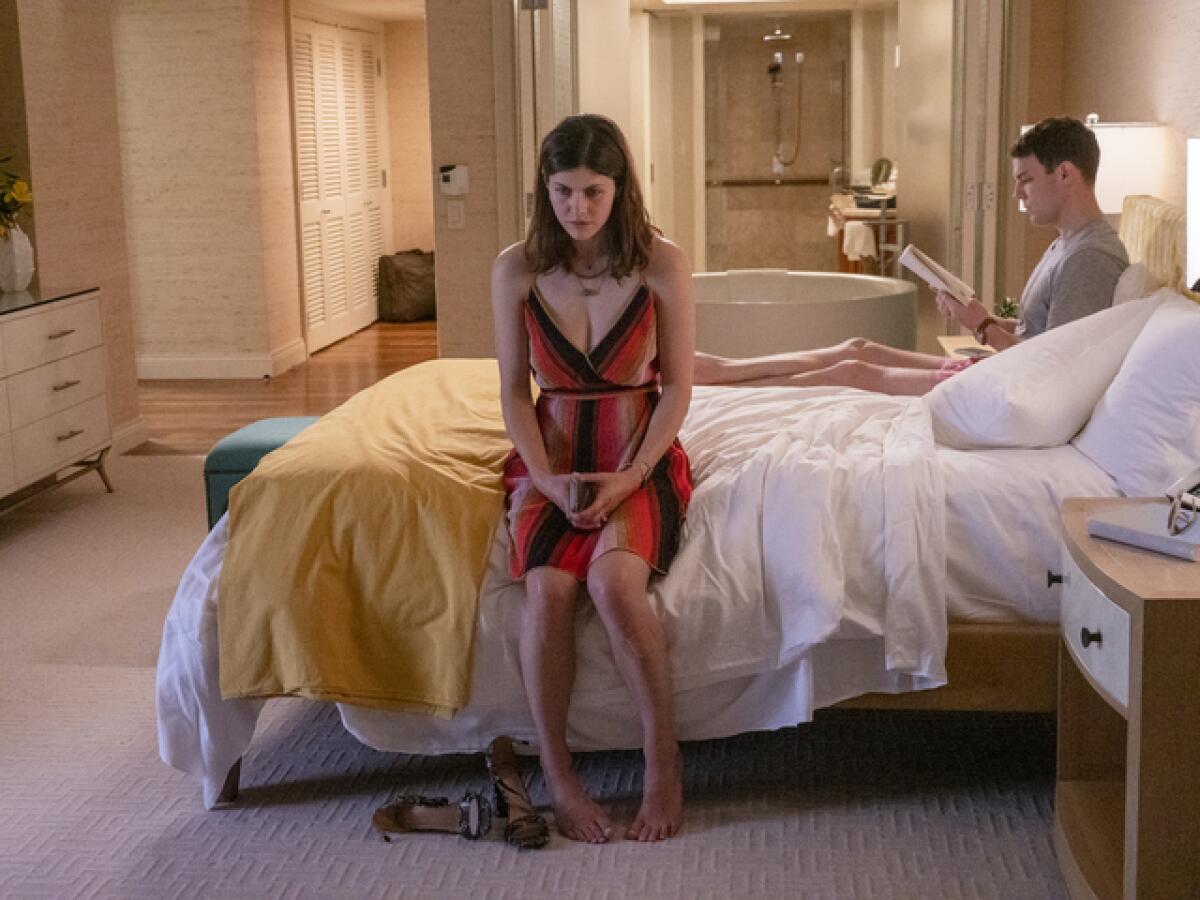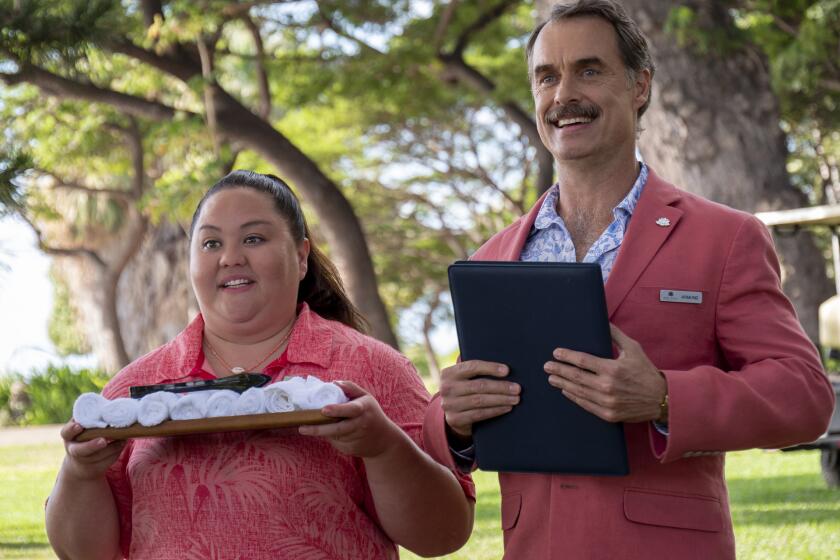‘The White Lotus’ drops a bomb in its wild finale. We break it all down

The following contains spoilers from the Season 1 finale of “The White Lotus.”
“The White Lotus,” writer-director Mike White’s sinister satire of Western imperialism, luxury tourism, the class divide and Oberlin College reading lists, has emerged as the most talked-about TV series of the summer. But it’s hard to tell with precision whether that’s thanks to its dreamy setting, its earworm of a score or the tragicomic stylings of Jennifer Coolidge.
Sunday’s season — not series — finale may tie up the loose ends of its multi-stranded narrative, but this is “The White Lotus,” so there’s still plenty of mess. (In one unforgettable moment, quite literally.) Did White stick the landing on his group portrait of trouble in paradise or did that hectic final hour reveal the series’ seams? Times TV critic Lorraine Ali and staff writer Meredith Blake break it all down, from the ideological to the scatological.
The complete guide to home viewing
Get Screen Gab for everything about the TV shows and streaming movies everyone’s talking about.
You may occasionally receive promotional content from the Los Angeles Times.
Meredith Blake, staff writer: Aloha, Lorraine! Our stay at “The White Lotus” has ended and there is much to discuss, but I suppose we have no choice but to start with the elephant in the room — or, to be more precise, the steaming turd in the Pineapple Suite. For six episodes now, “The White Lotus” has kept us playing an irresistible game of guess-who’s-in-the-coffin. We now have an answer, as well as an indelible image of a grown man pooping into a suitcase before keeling over and dying in a king-sized bathtub. It’s a death destined to go down in HBO history.
Lorraine Ali, TV critic: Mahalo, Meredith, for starting this convo exactly where I expected you would. Mystery solved, but not before paradise literally turns to [unprintable word here]. Frankly, everyone was so unhappy at the resort that death seemed like a sweet release. The collection of reprehensible characters doing insidiously horrible things in the series was impressive in a misery-porn sort of way.
Blake: Some might dismiss the dead-body-at-the-top-of-the-series as a gimmick, but I found it devastatingly effective in ratcheting up the tension and dread. And the whole murder-mystery-in-an-exquisite-setting is a time-honored tradition dating back to Agatha Christie. To White’s credit, there were many characters who seemed destined for (or deserving of) an untimely death. For a while there I was sure that Tanya’s boyfriend — you know, the one from BLM — was a serial killer who was going to murder her and run off with her jewels. At another point, I was convinced Quinn would kill off his family in a scuba diving “accident.” There was even a minute or two when I thought Kai would get back at Paula for screwing him over in such spectacular fashion.
Armond was clearly on a downward spiral from Episode 1, but I wasn’t completely sure he was a goner until he unbuckled his pants and unleashed his bowels on Shane’s hideous seascape sweater. (If only it had been his Cornell hat!) And even then, I prayed for a miracle, because I have found Murray Bartlett so brilliant and sympathetic as Armond, a man whose tightly wound, obsequious demeanor can’t quite mask his deep-seated despair. (Bartlett is every bit as good as the rightfully praised Coolidge, IMHO.) I’m at least glad that Armond went out in a blaze of coke-fueled glory, giving a virtuoso final performance as dinner host (set to “Jesu, Joy of Man’s Desiring”) before taking that cathartic revenge dump. Best of all, he died with a look of peace on his face.
Ahead of Sunday’s finale, catch up on our coverage of the series, from its $9,000-a-night ‘hotel from hell’ to its most glaring blind spots.
Ali: I was rooting for Paula to beat Olivia to death with her copy of “Discourse on Colonialism,” or for Lani, the pregnant employee who vanishes after giving birth in Armond’s office, to come back and slay someone. Anyone. (OK, Shane first.) I needed a follow-up to her story. One of the problems I had with the series is that it spent too much time satirizing the self-centered issues of the resort’s rich guests and their interplay with the staff instead of exploiting the despondency on both sides of the divide. The nuanced slow burn of wealthy folks drowning in their own dysfunction is nothing new, especially to HBO, and it was a slog at times. That said, Armond was also one of my favorite characters, and his exit was epic.
Blake: It certainly was. Because I am an intrepid journalist, I immediately began to wonder about the mechanics of the deadly doo-doo. (For starters, what was the turd made of? Who was responsible for creating the fake poop? Props? Visual effects? God forbid… craft services?) But mostly I admired White for his willingness to completely and utterly go there and make the scene as over-the-top as possible. A more timid filmmaker would have cut to a tasteful close-up of Armond’s face before the first turd fell. But not White. In any case, the poo-nami was a fitting farewell for Armond, and a microcosm of the show as a whole — twisted, outrageously funny and deeply sad all at once.
The thing I love about White’s work, dating back to the dear, departed “Enlightened,” is his comfort with complexity, his willingness to be deeply compassionate to the characters he’s also skewering, the ease with which he switches from poetry to potty humor. In a single episode you can have an underwater sequence so beautiful it brought a tear to my eye (side note: He really loves sea turtles) and a gross-out close-up of a poop. Just like life itself! Anyway, I’ll curtail my verbal diarrhea and let you share your thoughts.
Ali: Thank you, Meredith. I will never again think of craft services in the same way. By the finale, I did not care who ended up going home in that box. Like Tom Hanks, I just wanted off the island.
“The White Lotus” ably mocks the wealthy patrons of a tropical resort. Its knives would have been even sharper if it had spent more time on the staff.
Blake: Let’s talk a little bit about who does and doesn’t get off the island. You raise a good point about Lani. I also wondered what became of poor, tragic Kai, who’s last seen running down the beach after the ill-fated heist. You could argue that White is simply less interested in what happens to the less affluent, non-white characters in the series. In fact, he told me he was “trying to get into the mind-set of the people who have money and the power” with this series. To that end, I felt like White was making a point about how expendable the employees are at a place like the White Lotus — they’re here one day, gone the next, only to be replaced by a new batch of “pleasant, interchangeable helpers,” as Armond once put it.
Even the supposedly progressive Paula ultimately treats Kai like a pawn in a revenge plot against the Mossbachers, never reaching out to him because she knows better than to implicate herself. That last shot of Belinda, robotically greeting another boatload of awful rich people as she stands next to Lani and Armond’s replacements, her life playing out like an endless rerun of “Fantasy Island,” says it all, really.
For the resort’s guests, things mostly turn out fine — which is how the world works when you’re wealthy. Rachel resigns herself to life as a plus one, which honestly sounds OK compared to being a poorly paid content aggregator. Despite literally killing someone, Shane jets off to Tahiti — where he is destined to never finish “Blink” — with nary a slap on the wrist. Tanya finally lets go of her mom’s ashes and heads to Aspen with her probably dying boyfriend.
The one person who seems significantly healthier by week’s end is Quinn, who has freed himself from the shackles of technology and is off on his hokule’a. Do we think he’ll get bored and fly back home? HBO recently announced plans for a second season of “The White Lotus,” with a new setting and presumably new guests. Got any suggestions for White to make the next season less excruciating for you?
Writer-director Mike White and his cast reveal how HBO’s limited series unearthed the ‘apocalyptic anxiety’ beneath the surface of luxury tourism.
Ali: White definitely makes the point that inequality is baked into the character outcomes, which stands to reason since that is the reality of the world — and so many cruise ship ports. But he does so almost exclusively from the colonizer’s vantage point, which is problematic on a lot of levels. For starters, it limits the series by giving it the same blind spots as the resort’s self-centered guests. There’s no shortage of satirical series out there about affluent jerks treating others like disposable wipes, and “The White Lotus” had the perfect chance to stretch that formula when it took a family like the Mossbachers out of their usual habitat and brought in characters like Lani and Kai. But it never moved beyond the absurdity of white affluence — money in lieu of parenting, the lopsided power-differential in their marriage — which frankly felt played out.
I mean, we both love the soundtrack by Cristobal Tapia De Veer, right? A large part of what makes it amazing is that it sounds like a collision of opposing cultures at the resort, a mixture of the tension between mainlanders and islanders, colonizers and natives, both historically and now. For me, Season 2 would be far more dynamic and smarter if it ventured into the employee break room before the hukilau dinner show or lei greeting or whatever “native entertainment” awaits guests at the next season’s White Lotus property. And that does not mean turning this HBO series into a woke diatribe. God no. It needs to stay sardonic with its working-class and non-white characters too (see “Ramy” or “Atlanta” for pointers). As for Quinn, I predict he’ll end up running a Sandals-like property in the 2024 spin-off “The Blue Flip Flop.”
Blake: Book now for the best rates!
More to Read
The complete guide to home viewing
Get Screen Gab for everything about the TV shows and streaming movies everyone’s talking about.
You may occasionally receive promotional content from the Los Angeles Times.









